Overview
The article titled "10 Legal Immigration News Updates Every Healthcare Worker Should Know" addresses crucial legal immigration changes affecting healthcare workers. It highlights significant updates, including new salary thresholds and visa eligibility requirements, along with the implications of recent legislation like the Strong Borders Act.
Healthcare professionals must stay informed about these developments to effectively navigate their immigration status. Have you ever felt overwhelmed by the complexities of immigration? You’re not alone. It’s essential to understand your rights and the changes that could impact your future.
We’re here to fight for you, ensuring you have the clarity needed in these challenging times. Remember, your future matters to us, and we’ll guide you every step of the way.
Introduction
Recent shifts in immigration policy have created a complex landscape for healthcare professionals seeking legal status in the U.S. and Canada. Have you ever felt overwhelmed by these changes? This article delves into ten crucial updates that every medical worker should be aware of, from new visa requirements to the implications of significant legislative changes. As these policies evolve, how can healthcare workers navigate the challenges and seize the opportunities that arise? Understanding these updates is essential for ensuring compliance and maximizing career potential in an increasingly competitive environment. Remember, you’re not alone in this fight; we’re here to guide you every step of the way.
Vasquez Law Firm: Key Immigration Policy Changes Impacting Your Status
Recent changes in immigration policy have introduced new requirements and opportunities for medical professionals seeking legal status in the U.S., which highlights the importance of following legal immigration news. Have you ever felt overwhelmed by these shifts? The termination of the Social Care Worker Visa pathway for new applicants significantly impacts workers in the medical field, limiting their choices for lawful access to the job market. Furthermore, modifications to visa eligibility now incorporate a minimum salary benchmark of £25,000 for most Health and Care Visa holders. This threshold is crucial, as it influences eligibility for various medical positions. Applicants must accumulate a minimum of 70 points for application approval, emphasizing the need for medical workers to meet these criteria to secure their positions.
The general salary threshold has also risen to £31,300, reflecting the growing demand for skilled medical professionals. This increase is especially significant as it shapes the compensation expectations for medical positions, which are essential for attracting and retaining talent in a competitive market. These changes are part of a broader effort to address the ongoing medical workforce shortages exacerbated by the COVID-19 pandemic and an aging population. Projections suggest a physician deficit of around 187,000 by 2037, particularly in rural regions, highlighting the urgent need for qualified medical professionals.
Healthcare workers must also be aware of the Immigration Skills Charge, which will increase by 32% to £1,320 per individual per year starting December 16, 2025. This charge applies when assigning a Certificate of Sponsorship for Skilled Worker Visa applications, adding another layer of financial consideration for employers and prospective employees alike. It’s important to know you have rights, even if others tell you otherwise.
Expert views indicate that these reforms could greatly transform the landscape of employment-based migration, as highlighted in recent legal immigration news, especially for medical professionals. As the Department of Homeland Security (DHS) aims to enhance oversight and protect U.S. workers' wages, the implications for immigrant healthcare workers are profound. Staying informed about legal immigration news is crucial for managing the intricacies of relocation procedures and ensuring adherence to new requirements. Healthcare professionals are encouraged to utilize resources such as legal consultations, professional associations, and government websites to stay informed on these changes. Remember, we’re here to fight for your family and your future matters to us.
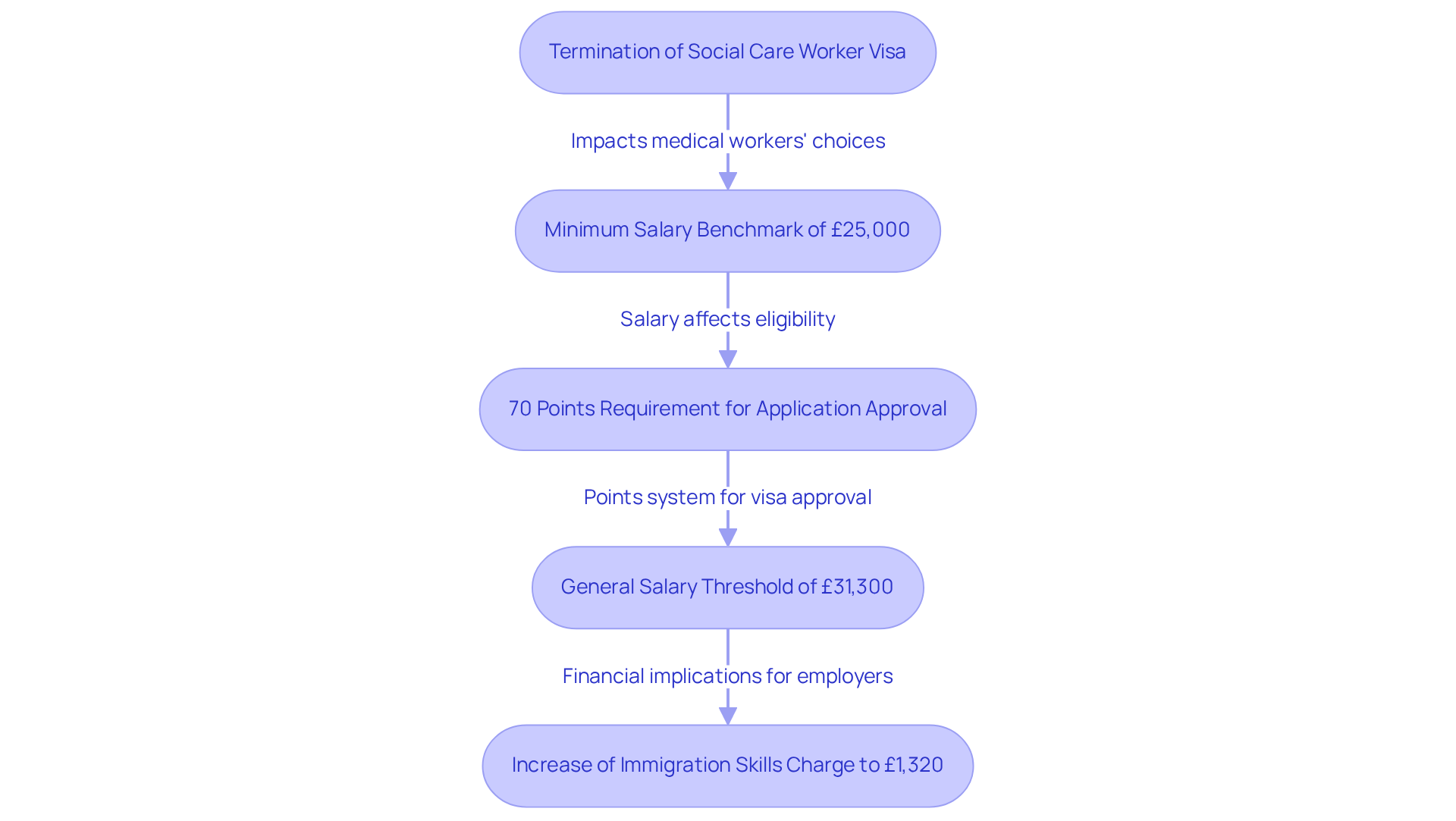
Bill C-12: Advancements in Canadian Immigration and Border Reforms
Bill C-12 is here to change the game. It aims to streamline the entry process and enhance border security, which could mean expedited processing times and new categories for skilled healthcare workers. Have you ever felt lost in the immigration process? Understanding these advancements is crucial for anyone seeking legal immigration news about moving to Canada.
But it’s not just about moving; it’s also vital to know your rights during travel emergencies, like ICE enforcement actions or deportation proceedings. You have the right to remain silent and the right to an attorney. We understand how overwhelming this feels.
At Vasquez Law Firm, we provide extensive legal services regarding residency matters, including:
- DACA
- Asylum
- Deportation defense
We’re here to help you navigate these changes effectively and ensure you comprehend your rights within the court system. Remember, you don’t have to face this alone—we’ll guide you every step of the way.
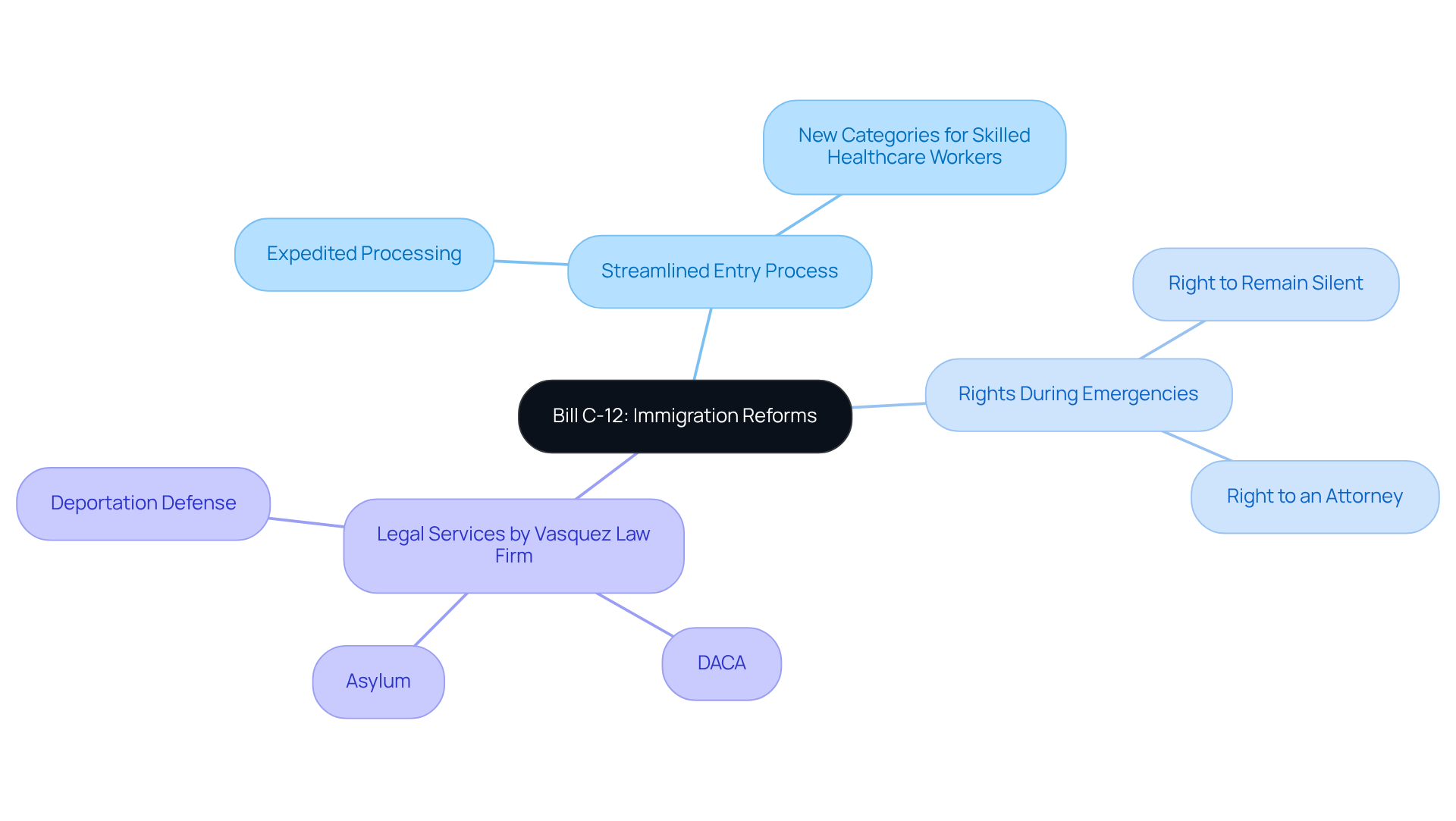
Canada's Immigration Backlog: Current Statistics and Implications
As of 2025, Canada is grappling with a significant backlog in residency applications, with over 1.8 million cases pending. This backlog can delay the processing of applications for medical professionals, making it essential to stay informed about processing times and strategies to minimize delays.
Have you ever felt overwhelmed by the immigration process? In the face of an immigration emergency, such as ICE enforcement actions or deportation proceedings, it’s vital to know your rights:
- You have the right to remain silent.
- You have the right to an attorney.
- You have the right not to sign documents without legal counsel.
We understand how daunting this situation can be. If you find yourself in such a predicament, don’t hesitate—contact Vasquez Law Firm immediately for urgent legal assistance. We’re here to fight for your family.
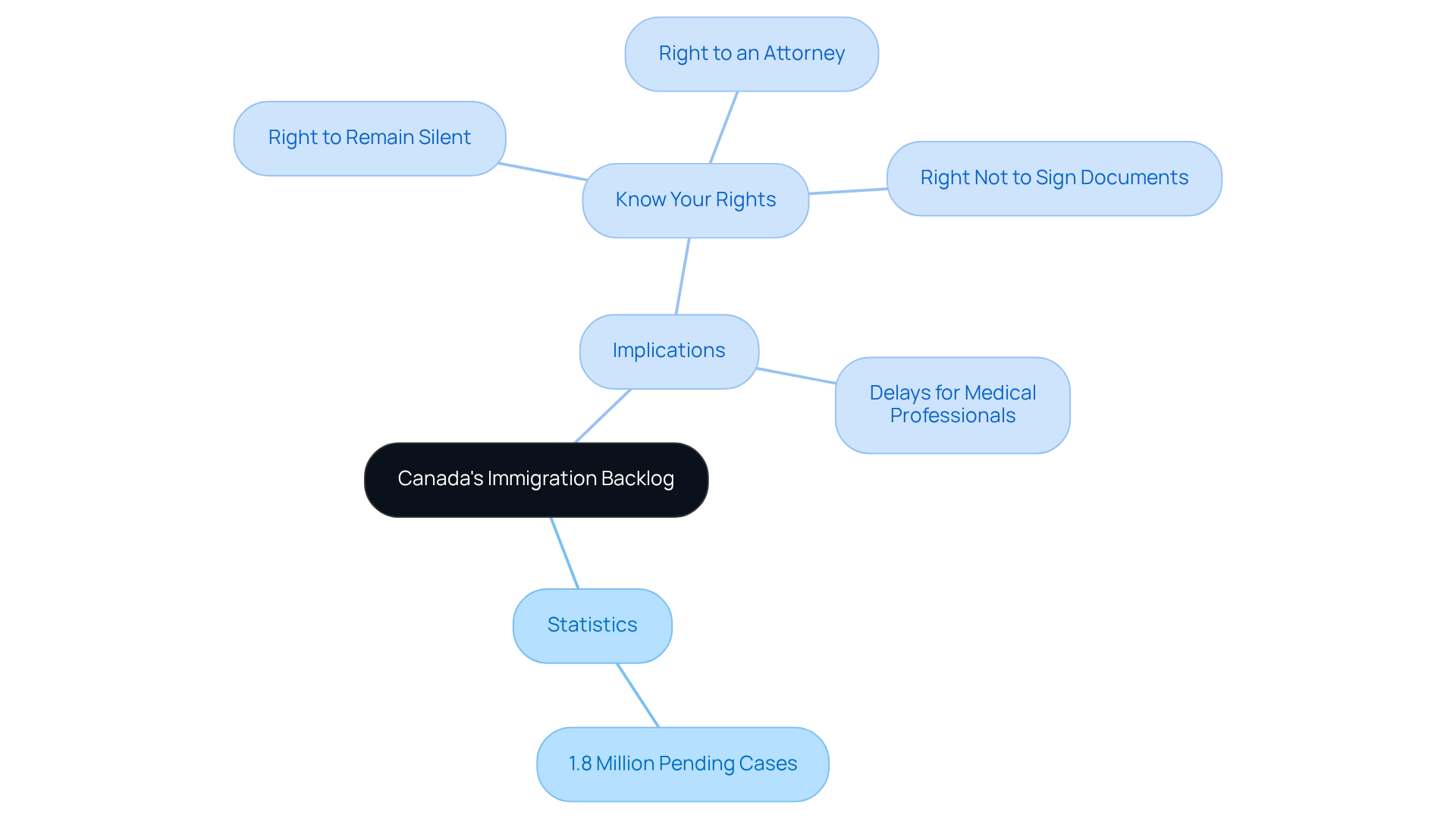
IRCC AI Implementation: Enhancing Efficiency in Immigration Applications
The Immigration, Refugees and Citizenship Canada (IRCC) has taken a significant step by integrating AI technologies to improve application processing efficiency. This move aims to reduce wait times and enhance decision-making accuracy, particularly benefiting medical professionals seeking visas and permanent residency. With the capability to handle up to 150 applications at once, AI tools like Chinook could expedite the review process by as much as 87 percent. This efficiency is vital, especially with over 901,000 applications currently backlogged.
Medical professionals stand to gain from these advancements as the IRCC seeks to tackle skilled labor shortages in Canada’s healthcare sector. By streamlining visa applications, AI not only provides quicker access to work permits but also enhances the overall experience for applicants. For example, the Francophone Minority Communities Student Pilot (FMCSP) program has effectively utilized AI to assist French-speaking international students, offering them expedited study permits and pathways to permanent residence.
However, the reliance on AI raises important questions about transparency and fairness in decision-making. Critics warn that automated systems may oversimplify complex cases, potentially resulting in biased outcomes. The IRCC acknowledges these challenges, stressing that while AI supports processing, final decisions rest with trained officers responsible for thorough evaluations. As AI integration progresses, it is crucial for healthcare professionals to stay informed about these developments, as they could significantly impact their relocation process.
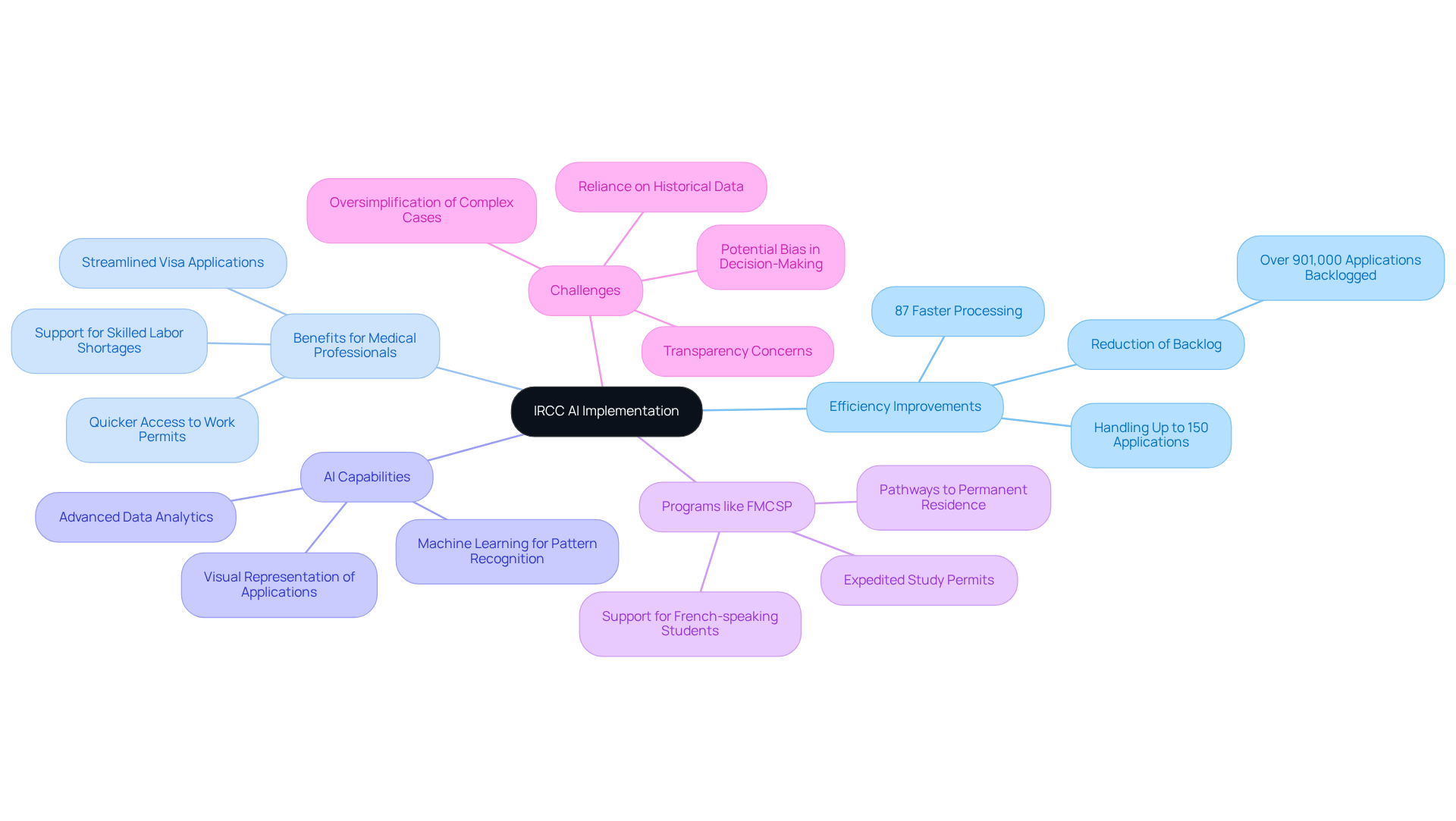
Court Rulings on Immigration: What You Need to Know
Recent court decisions, as reported in legal immigration news, have clarified various aspects of migration law, including the rights of applicants and the duties of authorities. As healthcare professionals, it’s vital to understand how these rulings may impact your applications and legal standing according to the latest legal immigration news. In situations where you receive a subpoena or face immigration enforcement, knowing your rights is crucial:
- You have the right to remain silent.
- You have the right to an attorney.
- You have the right not to sign documents without legal counsel.
If you encounter ICE enforcement actions, do not open your door unless ICE has a warrant signed by a judge. Exercise your right to remain silent and request an attorney immediately. At Vasquez Law Firm, we are here to provide urgent legal assistance 24/7, ensuring that you have the support you need during these critical moments. Our comprehensive legal services include:
- Immigration services (visas, green cards, citizenship, deportation defense)
- Personal injury representation (car accidents, workplace injuries)
- Criminal defense (DUI, drug crimes)
- Family law (divorce, custody)
- Traffic violations defense
This makes us a reliable partner for healthcare workers navigating complex legal landscapes. Remember, you’re not alone in this fight. Your rights matter, and we’re here to help you every step of the way.
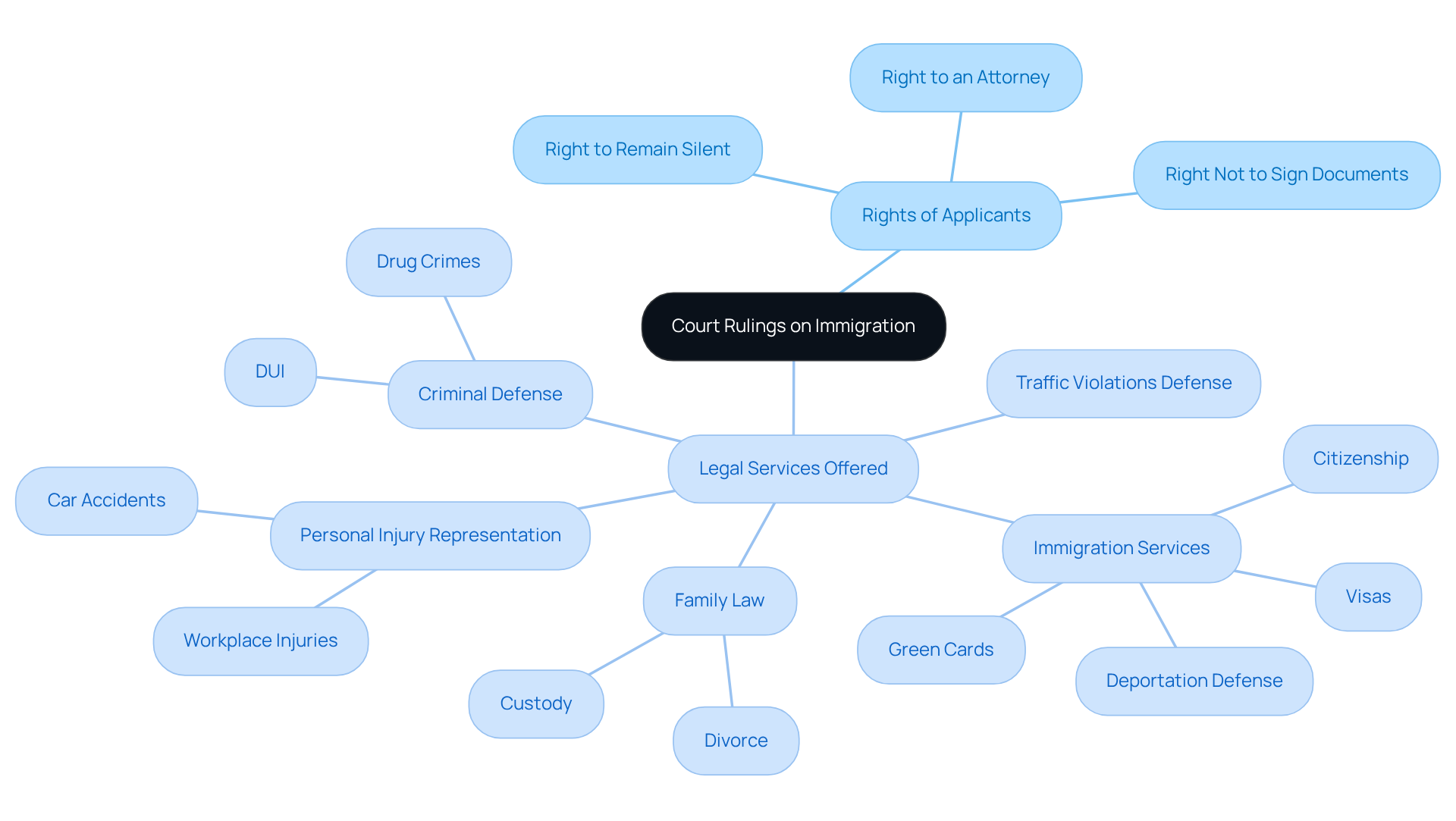
Express Entry Draw Results: Insights and Future Predictions
The latest Express Entry draw results are important legal immigration news, revealing a significant shift in the minimum Comprehensive Ranking System (CRS) scores required for invitations.
Healthcare workers, have you ever felt uncertain about your eligibility? It’s crucial to monitor the legal immigration news results closely. Changes in the CRS scores can directly impact your strategy for applying, as highlighted in legal immigration news.
Remember, you’re not alone in this process; we’re here to support you every step of the way. Stay informed and ready to act—your future matters.
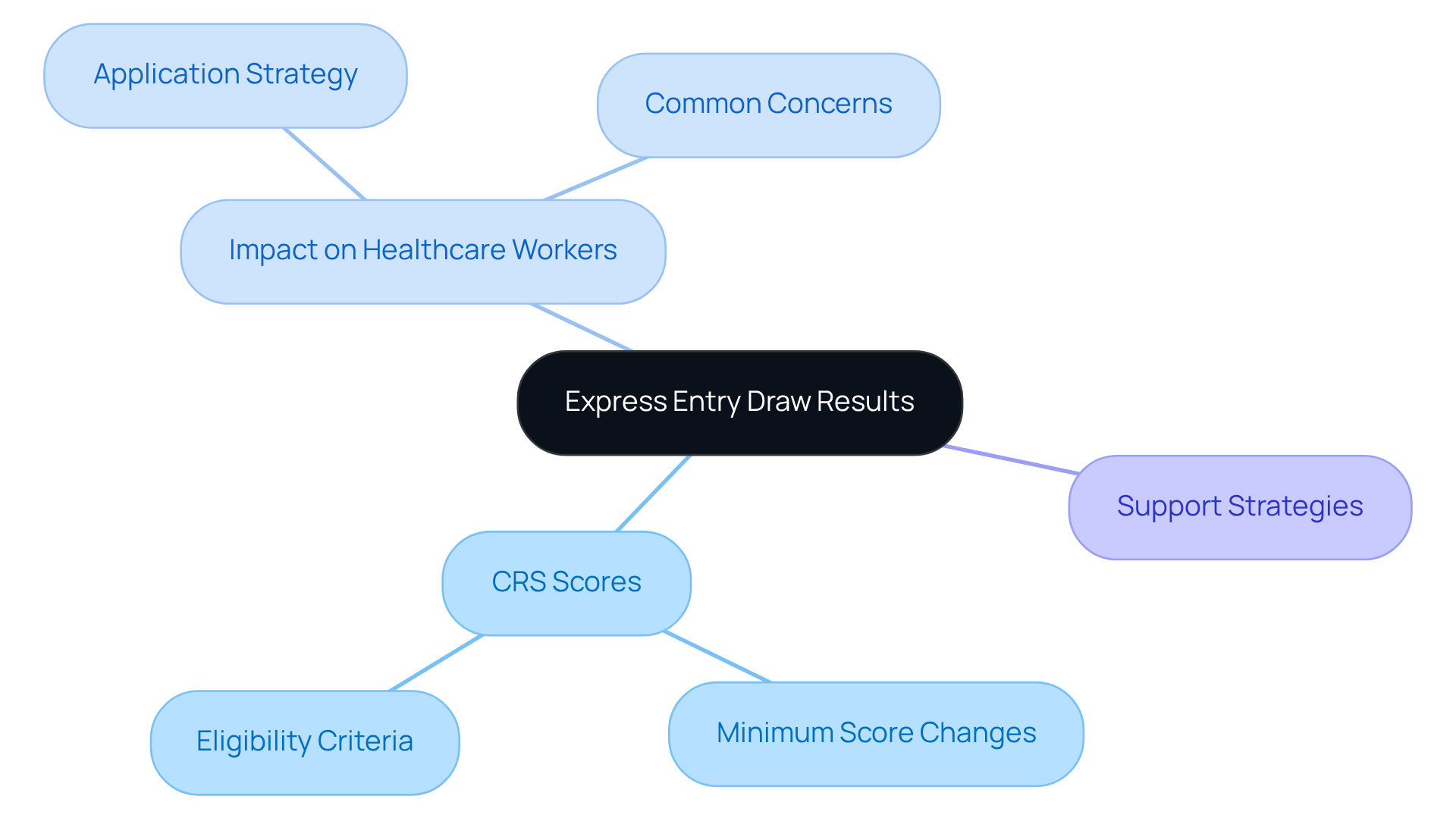
New Rules for International Students: Navigating Changes in 2025
In 2025, significant changes to immigration rules for international students will take effect, directly impacting work permits and pathways to permanent residency. F-1 and J-1 visa holders will face a maximum stay of four years—shorter than the average 4.3 years needed to complete a degree in the U.S. This shift poses challenges, especially for medical students who often require extended periods to fulfill their educational and training requirements.
Healthcare students studying in Canada should be particularly aware of these changes, as they may influence their ability to secure work permits and navigate residency pathways. The new rules will:
- Restrict undergraduate students from changing majors during their first year
- Not allow graduate students to switch programs at all
Such limitations could hinder the academic flexibility necessary for medical students to adapt their studies to meet evolving career goals.
Moreover, the suggested regulations will enforce a total stay limit of 24 months for students in language programs, complicating the educational environment for those pursuing careers in the medical field. As these changes unfold, it’s crucial for medical students to stay informed and strategize effectively to maximize their immigration opportunities. Remember, you’re not alone in this fight—staying proactive is key to successfully transitioning from education to employment in your chosen field.
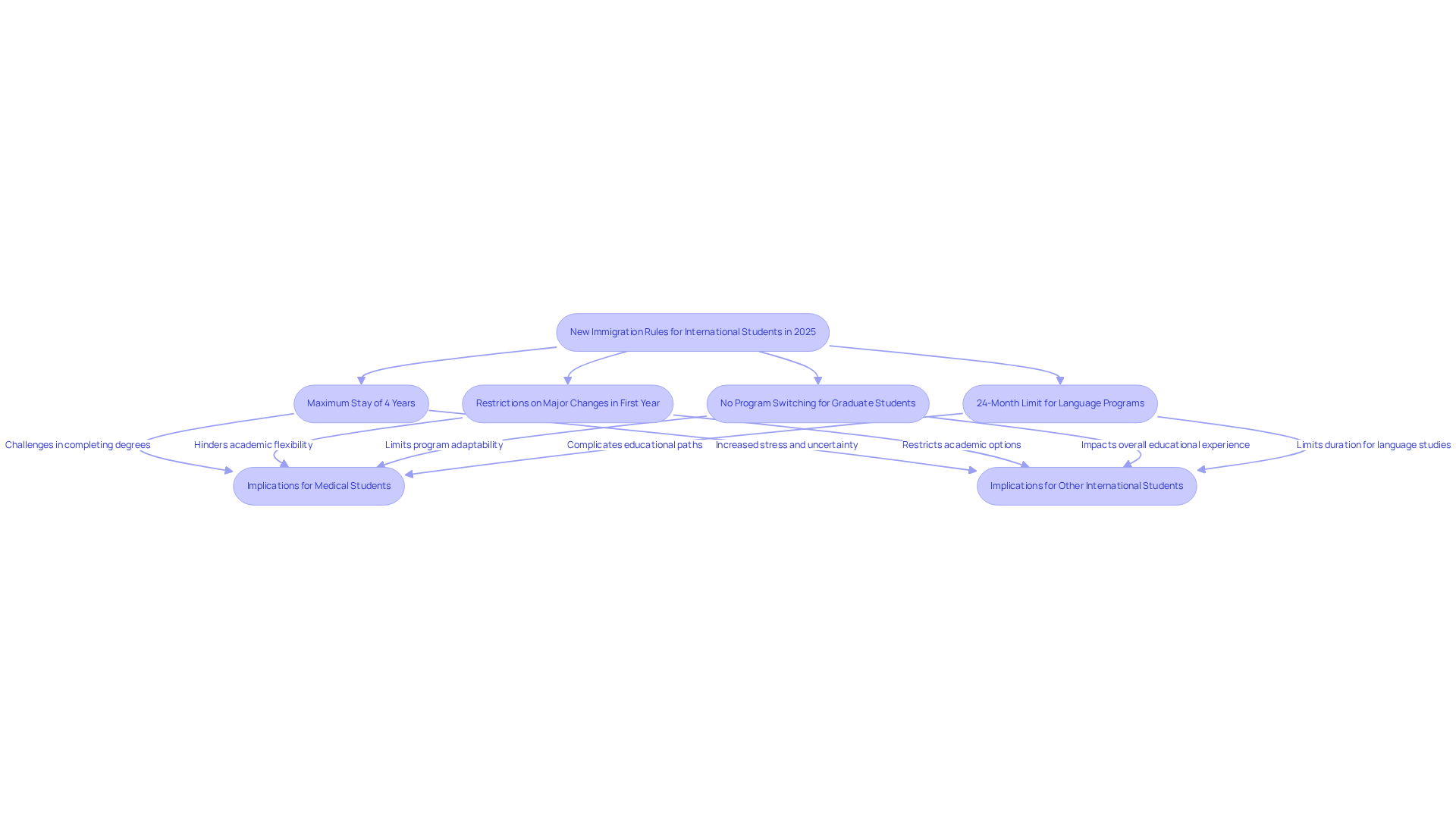
Challenges for Immigrant Healthcare Workers: Addressing Language and Resource Barriers
Immigrant medical professionals often confront significant language barriers and limited access to essential resources, which can hinder their job opportunities. Did you know that immigrants make up 18.2% of all medical workers in the U.S.? This statistic underscores the importance of supporting this vital segment of our workforce.
Successful integration into the medical system demands targeted solutions. Comprehensive language training programs can enhance communication skills and cultural competency, making a real difference. Support networks are crucial in this journey, providing mentorship and guidance to navigate the complexities of the U.S. medical landscape.
For instance, national and local initiatives aim to attract medical personnel from overseas, offering resources to help medical professionals understand licensing criteria and employment application processes. These initiatives not only facilitate smoother transitions into the workforce but also foster a sense of community among immigrant employees.
However, the challenges posed by restrictive immigration policies are frequently highlighted in legal immigration news. It is essential for immigrant medical professionals to pursue specific training programs and support networks to overcome these hurdles. By addressing these challenges head-on, the medical field can better leverage the skills and talents of immigrant workers, ultimately contributing to a more robust and diverse workforce.
Moreover, the ongoing impact of COVID-19 on medical personnel further highlights the urgent need for strategic assistance for immigrant individuals in this critical sector. Remember, you are not alone in this fight—we're here to support you every step of the way.
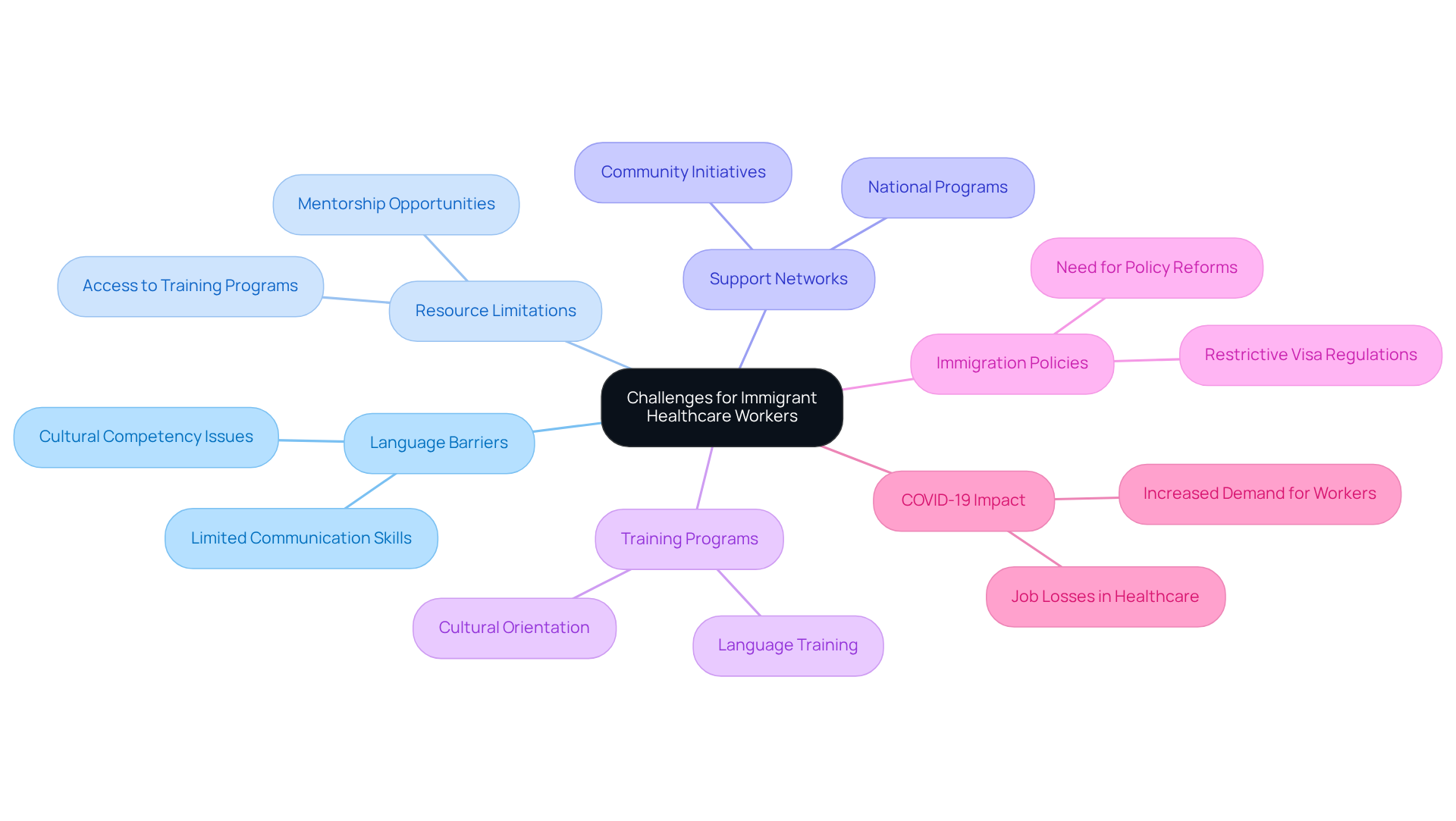
The Strong Borders Act: Implications for Immigration and Security
The Strong Borders Act, introduced in June 2025, significantly tightens border control in Canada, presenting new challenges for practitioners seeking to enter or stay in the country. This legislation empowers law enforcement to access personal information from various service providers without a warrant, raising serious concerns about privacy and compliance. Healthcare workers, who often navigate complex immigration pathways, must be particularly vigilant, as these changes could directly impact their ability to work and reside in Canada.
Have you ever felt lost in the immigration process? Experts have expressed worries that the Act's ambiguous 'public interest' criterion may lead to unpredictable enforcement actions, potentially jeopardizing the status of numerous medical practitioners. For instance, individuals who have been in Canada for over a year may find their asylum claims ineligible, limiting their options for legal residency. This uncertainty can create significant anxiety for those in the medical field, who are essential to the Canadian workforce.
Real-world examples illustrate the impact of these stricter measures. Healthcare workers have reported challenges in obtaining work permits and navigating the asylum process, often feeling the pressure of adhering to new regulations. The potential for increased scrutiny and the risk of having valid permits canceled due to non-compliance with the Act's provisions further complicate their situations.
As the field of migration control evolves, it’s crucial for medical professionals to stay informed about legal immigration news and these changes. Interacting with legal specialists and advocacy organizations can provide vital advice on managing the complexities brought about by the Strong Borders Act, ensuring that medical practitioners can continue supporting Canada's health system without unnecessary risk to their residency status. Remember, your future matters to us. We’re here to fight for your family.
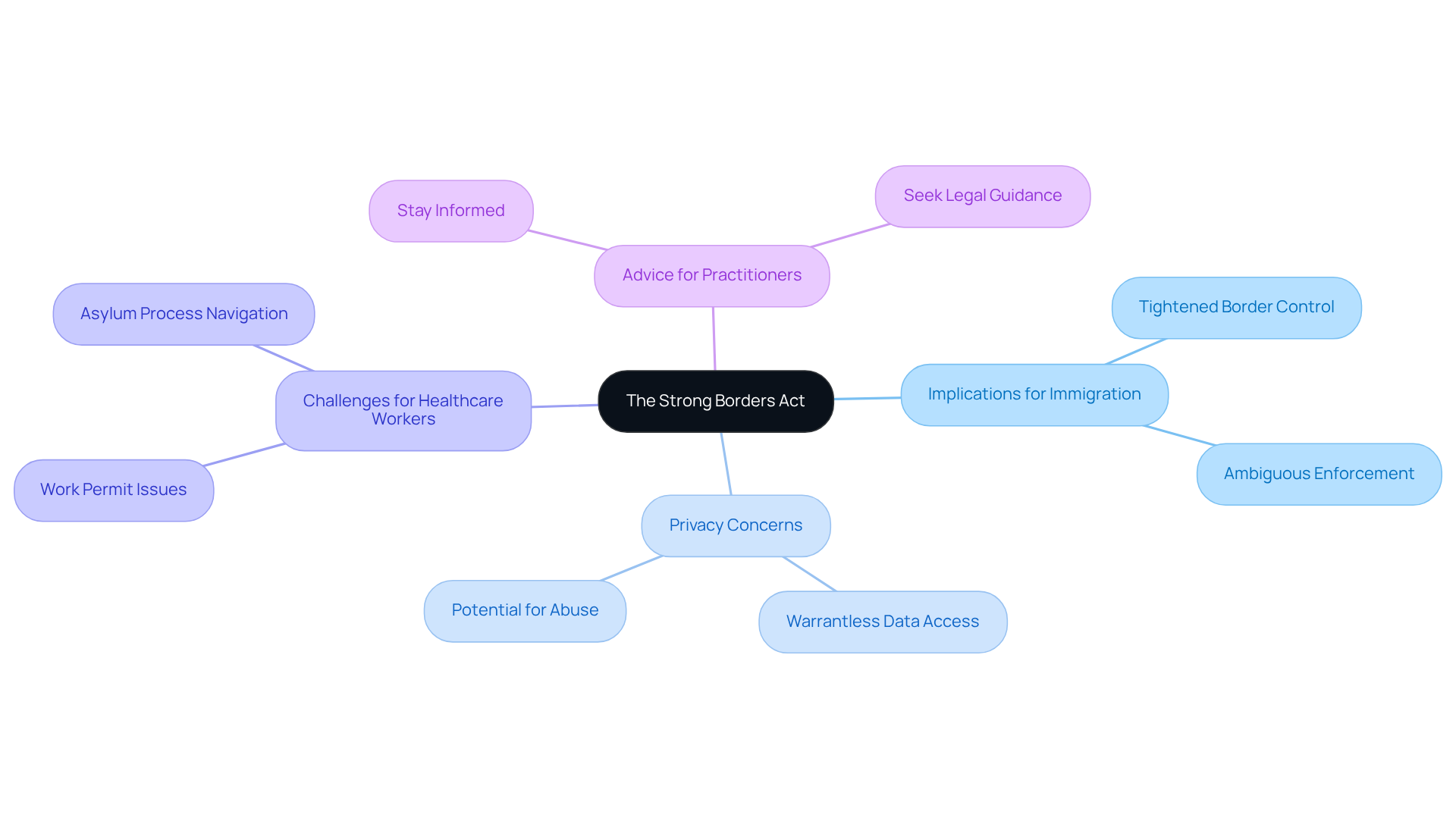
Current Trends in Canadian Immigration: What to Watch For
Present patterns in Canada indicate a significant shift towards attracting skilled professionals, especially in the medical field. The Government of Canada has set ambitious targets for permanent resident admissions, with nearly 62% of these anticipated to come from the economic category by 2027. This focus on skilled workers is crucial as Canada faces a notable shortage of medical practitioners, necessitating the recruitment of international talent to fill workforce gaps.
In 2025, the recruitment of medical professionals will take center stage, aligning with the government's broader strategy to enhance the medical system. For instance, new immigration pilot programs, such as enhanced caregiver pilots, will provide pathways to permanent residency for home care staff upon their arrival. This initiative is part of a concerted effort to attract talented individuals who can contribute to the sector's sustainability and growth.
Healthcare professionals contemplating immigration should consider how their applications can align with these government priorities. As Marc Miller, Minister of IRCC, stated, "Express Entry candidates will no longer receive extra points for having a job offer," which directly impacts the immigration applications of individuals in the medical field. Candidates with experience in high-demand areas, such as nursing or specialized medical fields, may find themselves in a favorable position. Additionally, the Francophone Minority Communities Student Pilot (FMCSP) supports French-speaking international students, creating further opportunities for those who can enrich Canada's bilingual medical landscape.
The anticipated increase in permanent resident entries for students and employees already in Canada is projected to exceed 40% in 2025, underscoring the significance of these trends for medical practitioners. As the government continues to refine its policies regarding the entry of foreign workers, including the removal of job offer points in the Express Entry system, medical professionals must stay informed about these changes.
Overall, the evolving landscape of Canadian immigration, according to recent legal immigration news, offers a unique opportunity for healthcare professionals to navigate the application process strategically, ensuring they meet the government's priorities while contributing to the nation's healthcare needs.
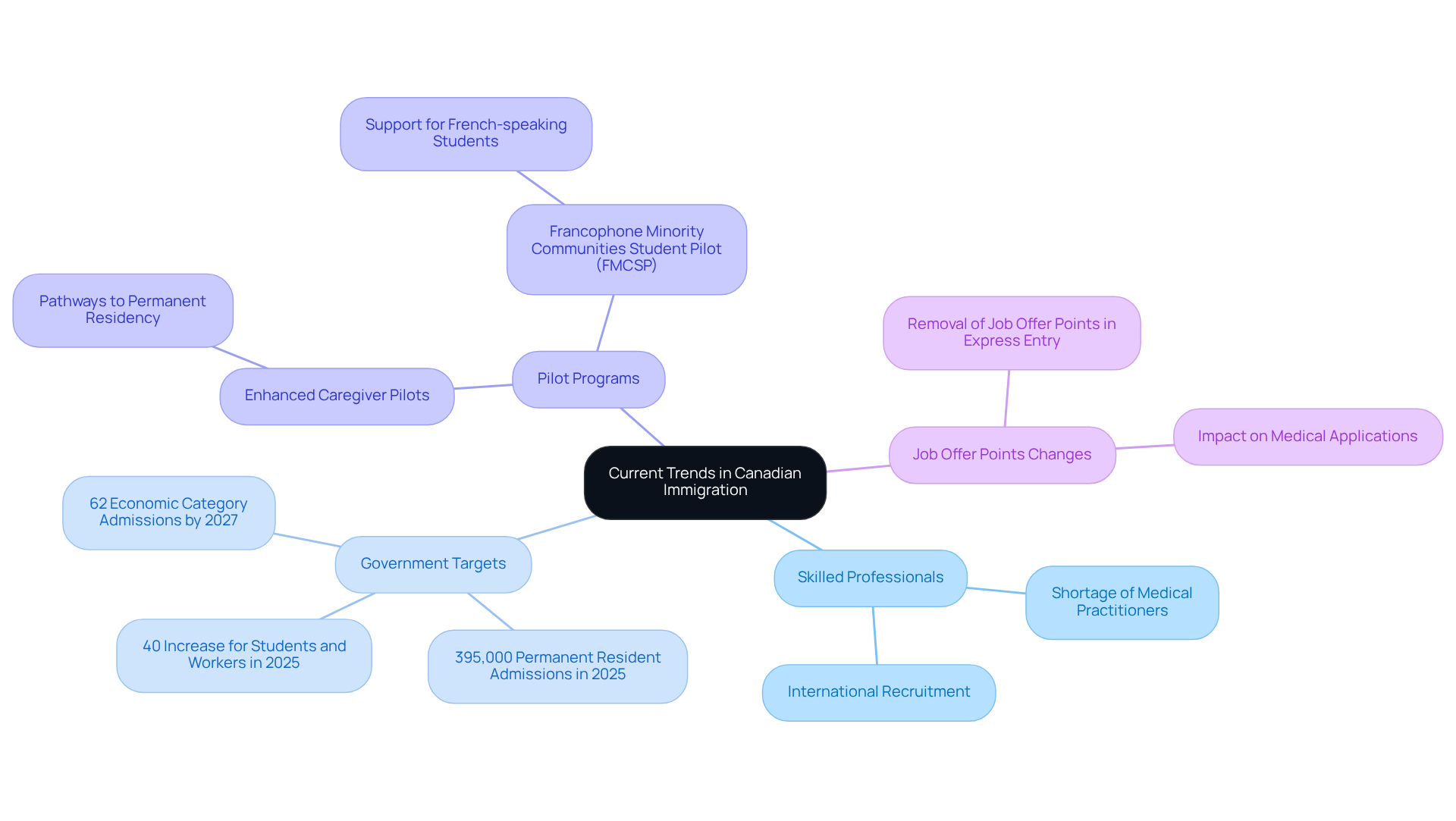
Conclusion
Staying informed about the evolving landscape of immigration policies is essential for healthcare workers aiming to navigate their professional paths in the U.S. and Canada. Have you felt the pressure of recent changes, such as shifts in visa eligibility, salary thresholds, and new legislation like Bill C-12 and the Strong Borders Act? These developments underscore the necessity for medical professionals to adapt and strategize effectively. Understanding these updates is not just about compliance; it’s about securing a future in a field increasingly reliant on skilled immigrant talent.
Key insights reveal the complexities healthcare workers face today:
- The rising Immigration Skills Charge
- The implications of Canada’s immigration backlog
- The integration of AI in processing applications
These are all significant factors shaping the environment in which healthcare professionals operate. It’s crucial to utilize available resources and legal support to navigate potential challenges. Moreover, addressing language and resource barriers is critical for successful integration into the medical workforce.
Ultimately, the ongoing transformation of immigration policies presents both challenges and opportunities for healthcare professionals. By remaining proactive and informed, you can better position yourself to take advantage of new pathways to residency and employment. It’s vital to seek legal guidance and utilize support networks to protect the rights and futures of immigrant healthcare workers. Engaging with these developments not only enhances your personal prospects but also strengthens the healthcare system as a whole. Remember, we’re in this fight together—your future matters to us.
Frequently Asked Questions
What recent changes have been made to immigration policy that affect medical professionals in the U.S.?
Recent changes include the termination of the Social Care Worker Visa pathway for new applicants and the introduction of a minimum salary benchmark of £25,000 for most Health and Care Visa holders.
What is the minimum points requirement for visa application approval for medical workers?
Applicants must accumulate a minimum of 70 points to secure approval for their visa applications.
How has the general salary threshold changed for medical professionals?
The general salary threshold has increased to £31,300, which influences compensation expectations for medical positions.
What is the projected physician deficit in the U.S. by 2037?
Projections suggest a physician deficit of around 187,000, particularly in rural regions.
What is the Immigration Skills Charge and how will it change?
The Immigration Skills Charge will increase by 32% to £1,320 per individual per year starting December 16, 2025, applying when assigning a Certificate of Sponsorship for Skilled Worker Visa applications.
What is Bill C-12 and how does it affect Canadian immigration?
Bill C-12 aims to streamline the entry process and enhance border security, potentially leading to expedited processing times and new categories for skilled healthcare workers.
What rights do individuals have during travel emergencies or deportation proceedings?
Individuals have the right to remain silent, the right to an attorney, and the right not to sign documents without legal counsel.
What is the current status of Canada's immigration backlog as of 2025?
Canada has over 1.8 million pending residency applications, which can delay processing times for medical professionals.
How can medical professionals stay informed about immigration changes?
Healthcare professionals are encouraged to utilize resources such as legal consultations, professional associations, and government websites to stay updated on immigration changes.




